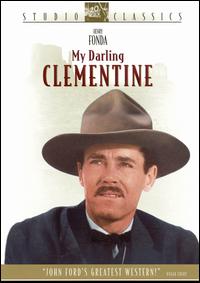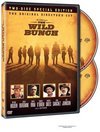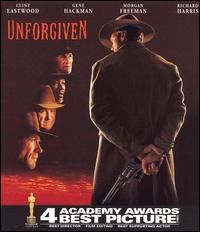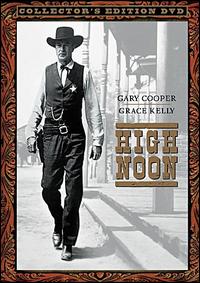Once Upon a Time in the West
 Destry Rides Again
Destry Rides AgainPN1997 .D47 1993
Tom Destry (James Stewart), son of a legendary frontier peacekeeper, doesn't believe in gunplay. Thus he becomes the object of widespread ridicule when he rides into the wide-open town of Bottleneck, the personal fiefdom of the crooked Kent (Brian Donlevy). His detractors laugh even louder when Destry signs on as deputy to drunken sheriff Wash Dimsdale (Charles Winninger). But the laughter subsides when Destry casually proves himself a crack shot, despite his abhorrence of firearms. Later, when saloon chanteuse Frenchy (Marlene Dietrich), Kent's gal, takes umbrage at Destry's indifferent reaction to her charms, she vows to make a fool of the new deputy. A huge moneymaker, Destry Rides Again served as a spectacular comeback for Marlene Dietrich, who two years earlier had been written off as "box office poison."~Hal Erickson, All Movie Guide
PN1997 .H54 1992
This Western classic stars Gary Cooper as Hadleyville marshal Will Kane, about to retire from office and go on his honeymoon with his new Quaker bride, Amy (Grace Kelly). But his happiness is short-lived when he is informed that the Miller gang, whose leader (Ian McDonald) Will had arrested, is due on the 12:00 train. Pacifist Amy urges Will to leave town and forget about the Millers, but this isn't his style; protecting Hadleyburg has always been his duty, and it remains so now. But when he asks for deputies to fend off the Millers, virtually nobody will stand by him. Chief Deputy Harvey Pell (Lloyd Bridges) covets Will's job and ex-mistress (Katy Jurado); his mentor, former lawman Martin Howe (Lon Chaney Jr.) is now arthritic and unable to wield a gun. Even Amy, who doesn't want to be around for her husband's apparently certain demise, deserts him. Meanwhile, the clocks tick off the minutes to High Noon -- the film is shot in "real time," so that its 85-minute length corresponds to the story's actual timeframe. Utterly alone, Kane walks into the center of town, steeling himself for his showdown with the murderous Millers. Considered a landmark of the "adult western," High Noon won four Academy Awards (including Best Actor for Cooper) and Best Song for the hit, "Do Not Forsake Me, O My Darling" sung by Tex Ritter. The screenplay was written by Carl Foreman, whose blacklisting was temporarily prevented by star Cooper, one of Hollywood's most virulent anti-Communists. John Wayne, another notable showbiz right-winger and Western hero, was so appalled at the notion that a Western marshal would beg for help in a showdown that he and director Howard HawksHigh Noon with Rio Bravo (1959). ~Hal Erickson, All Movie Guide
Watch the trailer:
Now watch a mash-up between High Noon and the Green Day song "Boulevard of Broken Dreams" titled "High Noon of Broken Dreams":
 My Darling Clementine
My Darling ClementinePN1997 .M889 1992
One of the greatest movie Westerns, John Ford's My Darling Clementine is hardly the most accurate film version of the Wyatt Earp legend, but it is still one of the most entertaining. Henry Fonda stars as former lawman Wyatt Earp, who, after cleaning up Dodge City, arrives in the outskirts of Tombstone with his brothers Morgan (Ward Bond), Virgil (Tim Holt), and James (Don Garner), planning to sell their cattle and settle down as gentlemen farmers. Yet Wyatt, disgusted by crime and cattle rustling, eventually agrees to take the marshalling job until he can gather enough evidence to bring to justice the scurrilous Clanton clan, headed by smooth-talking but shifty-eyed Old Man Clanton (Walter Brennan). Almost immediately, Wyatt runs afoul of consumptive, self-hating gambling boss Doc Holliday (Victor Mature, in perhaps his best performance). When Doc's erstwhile sweetheart, Clementine (Cathy Downs) comes to town, Earp is immediately smitten. However, Doc himself is now involved with saloon gal Chihauhua (Linda Darnell). The tensions among Wyatt, Doc, Clementine, and Chihauhua wax and wane throughout most of the film, leading to the legendary gunfight at the OK Corral, with Wyatt and Doc fighting side-by-side against the despicable Clantons. Its powerful storyline and full-blooded characterizations aside, My Darling Clementine is most entertaining during those little "humanizing" moments common to Ford's films, notably Wyatt's impromptu "balancing act" while seated on the porch of the Tombstone hotel, and Wyatt's and Clementine's dance on the occasion of the town's church-raising. Based on Stuart N. Lake's novel Wyatt Earp, Frontier Marshall (previously filmed twice by Fox), the screenplay is full of wonderful dialogue, the best of which is the brief, philosophical exchange about women between Earp and Mac the bartender (J. Farrell MacDonald). The movie also features crisp, evocative black-and-white photography by Joseph MacDonald. Producer (Daryl F. Zanuck) was displeased with Ford's original cut and the film went through several re-shoots and re-edits before its general release in November of 1946. ~Hal Erickson, All Movie Guide


PN1997 .W54 1999
"If they move, kill 'em!" Beginning and ending with two of the bloodiest battles in screen history, Sam Peckinpah's classic revisionist Western ruthlessly takes apart the myths of the West. Released in the late '60s discord over Vietnam, in the wake of the controversial Bonnie and Clyde (1967) and the brutal "spaghetti westerns" of Sergio Leone, The Wild Bunch polarized critics and audiences over its ferocious bloodshed. One side hailed it as a classic appropriately pitched to the violence and nihilism of the times, while the other reviled it as depraved. After a failed payroll robbery, the outlaw Bunch, led by aging Pike Bishop (William Holden) and including Dutch (Ernest Borgnine), Angel (Jaime Sanchez), and Lyle and Tector Gorch (Warren Oates and Ben Johnson), heads for Mexico  pursued by the gang of Pike's friend-turned-nemesis Deke Thornton (Robert Ryan). Ultimately caught between the corruption of railroad fat cat Harrigan (Albert Dekker) and federale general Mapache (Emilio Fernandez), and without a frontier for escape, the Bunch opts for a final Pyrrhic victory, striding purposefully to confront Mapache and avenge their friend Angel. ~Lucia Bozzola, All Movie Guide
pursued by the gang of Pike's friend-turned-nemesis Deke Thornton (Robert Ryan). Ultimately caught between the corruption of railroad fat cat Harrigan (Albert Dekker) and federale general Mapache (Emilio Fernandez), and without a frontier for escape, the Bunch opts for a final Pyrrhic victory, striding purposefully to confront Mapache and avenge their friend Angel. ~Lucia Bozzola, All Movie Guide
Watch the trailer:
 Unforgiven
Unforgiven
PN1997 .U535 2002
 pursued by the gang of Pike's friend-turned-nemesis Deke Thornton (Robert Ryan). Ultimately caught between the corruption of railroad fat cat Harrigan (Albert Dekker) and federale general Mapache (Emilio Fernandez), and without a frontier for escape, the Bunch opts for a final Pyrrhic victory, striding purposefully to confront Mapache and avenge their friend Angel. ~Lucia Bozzola, All Movie Guide
pursued by the gang of Pike's friend-turned-nemesis Deke Thornton (Robert Ryan). Ultimately caught between the corruption of railroad fat cat Harrigan (Albert Dekker) and federale general Mapache (Emilio Fernandez), and without a frontier for escape, the Bunch opts for a final Pyrrhic victory, striding purposefully to confront Mapache and avenge their friend Angel. ~Lucia Bozzola, All Movie GuideWatch the trailer:
 Unforgiven
UnforgivenPN1997 .U535 2002
Dedicated to his mentors Sergio Leone and Don Siegel, Clint Eastwood's 1992 Oscar-winner examines the mythic violence of the Western, taking on the ghosts of his own star past. Disgusted by Sheriff "Little Bill" Daggett's decree that several ponies make up for a cowhand's slashing a whore's face, Big Whiskey prostitutes, led by fierce Strawberry Alice (Frances Fisher), take justice into their own hands and put a $1000 bounty on the lives of the perpetrators. Notorious outlaw-turned-hog farmer William Munny (Eastwood) is sought out by neophyte gunslinger the Schofield Kid (Jaimz Woolvett) to go with him to Big Whiskey and collect the bounty. While Munny insists, "I ain't like that no more," he needs the bounty money for his children, and the two men convince Munny's clean-living comrade Ned Logan (Morgan Freeman) to join them in righting a wrong done to a woman. Little Bill (Oscar-winner Gene Hackman), however, has no intention of letting any bounty hunters impinge on his iron-clad authority. When pompous gunman English Bob (Richard Harris) arrives in Big Whiskey with pulp biographer W.W. Beauchamp (Saul Rubinek) in tow, Little Bill beats Bob senseless and promises to tell Beauchamp the real story about violent frontier life and justice. But when Munny, the true unwritten legend, comes to town, everyone soon learns a harsh lesson about the price of vindictive bloodshed and the malleability of ideas like "justice." "I don't deserve this," pleads Little Bill. "Deserve's got nothin' to do with it," growls Munny, simultaneously summing up the insanity of western violence and the legacy of Eastwood's Man With No Name. ~Lucia Bozzola, All Movie Guide
Watch the trailer:

0 Comments:
Post a Comment
<< Home